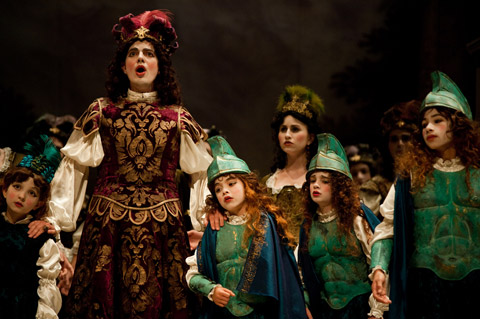
SING ON! Countertenor Philippe Jaroussky was stellar in BEMF’s Niobe as well as a Handel/Vivaldi recital with Apollo’s Fire. |
This was a very mixed year in classical music. Boston suffered big losses, including
James Levine as music director of the Boston Symphony Orchestra. In his brief tenure, he transformed and transfigured the BSO, but too many physical setbacks had him canceling more concerts than he led. One of the top contenders as his replacement — Riccardo Chailly — was about to make his BSO debut this January, but health problems forced him to cancel as well. We can stop thinking about Chailly.
One of Boston's favorite visitors, Teatro Lirico d'Europa, the international touring company that brought low-priced, old-fashioned opera, often with impressive old-fashioned singing, has been evicted from its local home at the Majestic to make room for ArtsEmerson. They went out with a bang-up Traviata.
We lost some other notable musicians: the witty, difficult, and influential Milton Babbitt, modernist extraordinaire, at 93; James Yannatos, at 82, endearing composer and conductor of the Harvard-Radcliffe Orchestra whose loving Mahler Fourth Symphony, in the early '60s, I remember fondly; composer Peter Lieberson, at 64, who did some of his best work for Boston, especially for his late wife, the beloved mezzo-soprano Lorraine Hunt Lieberson. Anyone who loved music or theater will miss the company of critic, composer, and echt Yankee Caldwell Titcomb (84). If you ran into him at a concert, you knew you were in the right place. They'll all be missed more than I can say.
But some of the old masters are very much with us, none more vigorously than Elliott Carter, who just celebrated his 103rd birthday at a concert in New York that included no fewer than five premieres. Russell Sherman, at 81, gave a stunning free recital at Jordan Hall, including a large-scale and exploratory Beethoven Waldstein Sonata and a heroic, shapely, and moving Liszt Sonata (no one plays Liszt better). Russian cellist Natalia Gutman, who knew Shostakovich and Prokofiev, played a sly and singing Shostakovich Second Concerto with the Boston Philharmonic under Benjamin Zander.
There was also a rich influx of younger musicians. At the BSO, composer Thomas Adès led his own dazzling work, and former BSO assistant concertmaster Ludovic Morlot replaced Levine in fresh, eye-and-ear-opening renditions of such BSO staples as Berlioz's Roman Carnival Overture and Ravel's Daphnis and Chloe Suite, along with a repeat of Carter's exciting and elegiac 2008 Flute Concerto (with Elizabeth Rowe), and continued Levine's planned survey of John Harbison symphonies with the jazzy, oddball Fourth. In No. 5, baritone Gerald Finley, under Jirí Belohlovek, sang magnificently Czeslaw Milosz's long and heartbreaking "Orpheus and Eurydice." (Soprano Sasha Cooke, Finley's stage wife in Doctor Atomic, was slightly less effective in Louise Glück's "Relic," Eurydice's take on the Orpheus legend.)
French countertenor Philippe Jaroussky mopped us up in his sublime aria to the Music of the Spheres in Steffani's Niobe, this year's Boston Early Music Festival opera (and its best). His musical sensitivity, vocal glamour, and technical wizardry were equally in evidence at his Handel/Vivaldi recital at Emmanuel Church with Cleveland's impressive historic-instrument ensemble Apollo's Fire. Young professionals brought Verdi's last opera, Falstaff, to life at the Somerville Theatre. The young and musically probing Courtney Lewis, now assistant conductor of the Minnesota Orchestra, returned with more exhilarating music-making with his young and impressive Discovery Ensemble. Ryan Turner and Emmanuel Music gave a sold-out crowd a memorable concert version of Stravinsky Rake's Progress.
And there was exciting music theater: the Huntington's spectacular Candide; Boston Conservatory's rare Kurt Weill, One Touch of Venus; and if ART'S Porgy and Bess remained controversial, its Three Pianos was sheer delight. Isn't all music music theater?